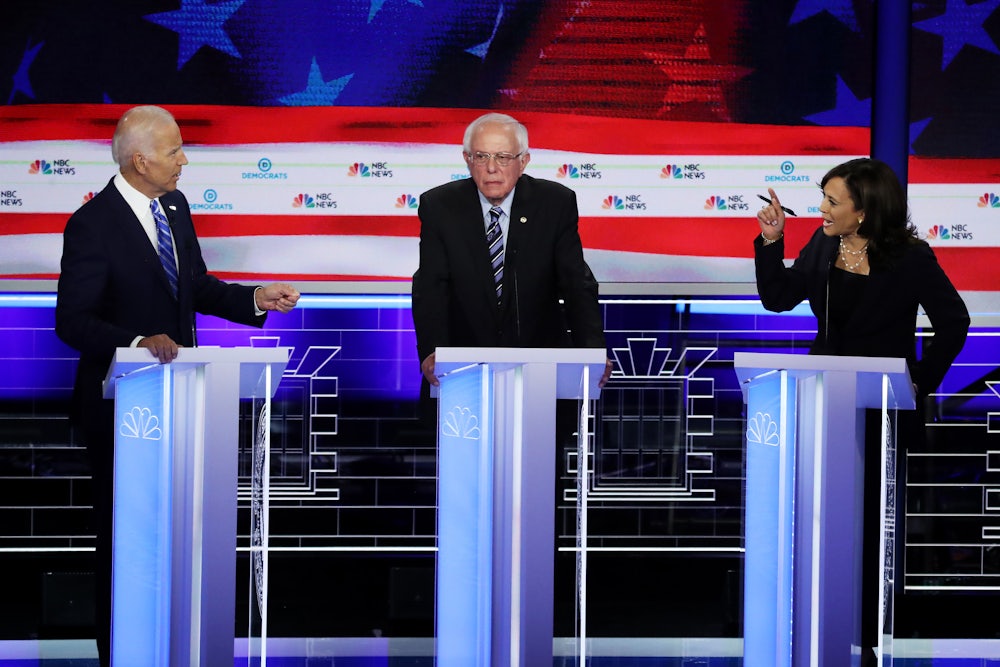It was the great nineteenth-century American poet, Ralph Waldo Emerson, who gave this advice to would-be literary upstarts: “Never strike a king unless you are sure that you can kill him.”
In presidential debates, Emerson’s truism might be expressed as, “Never strike a frontrunner unless you are sure you can dethrone him.”
Thursday night, two California Democrats went after Joe Biden: Eric Swalwell, a little-known, 38-year-old congressman, and Senator Kamala Harris, long seen as a major challenger who had been left frustrated on the sidelines, as first Pete Buttigieg and then Elizabeth Warren surged.
Swalwell failed in his bold and unexpected attempt. And Harris—whose deftly executed attack on Biden’s civil-rights record dominated the soundbite wars—left the former vice president rocked, but still standing.
Early in the debate, Swalwell recalled Biden coming before the California Democratic Convention during his first presidential bid in 1987 and declaring, “It’s time to pass the torch to a new generation of Americans.” Swalwell did not mention in the debate that John Kennedy coined that line, but hopefully at the time he first used it, Biden (who later had his own plagiarism problems) credited JFK’s Inaugural Address.
Biden batted away Swalwell’s generational attack by saying fiercely, “I am still holding on to that torch.” And then moments later, the 76-year-old Biden got an unexpected assist from Bernie Sanders, 77. Trying to break into the conversation, Sanders could be heard shouting over a multicandidate din, “As part of Joe’s generation....”
There were other moments in the debate when this odd-couple generational alliance between two septuagenarians transcended their obvious ideological differences. Late in the evening, when all the candidates were asked to name the first world leader they would contact to repair Donald Trump’s geopolitical wreckage, both Biden (who said NATO) and Sanders (the United Nations) pointed to 1940s institutions as the bulwark of American foreign policy.
Harris’s obviously premeditated assault was aimed at one of the blots on Biden’s long record in public life: his 1970s opposition to busing. She found her opening when spiritual guru Marianne Williamson—of all people—came out firmly in favor of reparations for slavery.
The California senator—the only African American on the Thursday night debate stage—began by talking in general terms about racial justice when she suddenly turned to Biden and said, “I’m going to now direct this to Vice President Biden. I do not believe you are a racist and I agree with you when you commit yourself to the importance of finding common ground.”
Harris then flicked at Biden’s recent comments about collaborating in the Senate on legislation with arch-segregationists like Mississippi’s James Eastland before adding (and you could almost imagine the shiv in her hands), “You also worked with them to oppose busing.”
There was a brief TV image of Biden—looking profoundly sad with his lips tightly closed—as Harris made the issue personal: “There was a little girl in California who was part of the second class to integrate her public schools and was bused to school every day. And that little girl was me.”
Biden tried to explain himself several ways—and merely illustrated the adage, “In politics, if you’re explaining, you’re losing.” Ultimately, he took refuge in a technical argument that, while true, was far from inspirational: “I did not oppose busing in America. What I opposed is busing ordered by the Department of Education.”
The truth, which is very hard to express in a 2019 context, is that Biden probably believed he would have been a one-term Delaware senator had he embraced federally mandated cross-district busing in the 1970s. NBC’s Steve Kornacki posted on Twitter a 1974 poll of Delaware voters that showed that three-quarters of the electorate opposed busing to achieve racial balance.
There is nothing that political pundits and armchair pollsters at home love as much as a flash of emotional drama in the midst of a presidential debate. And that is why everyone in the world watching American television—whether they are in Ulan Bator, Ukraine, or Utah—will see an endless reel of Harris confronting Biden.
The danger, though, lies in overhyping the lasting significance of this (cliché alert) viral moment more than seven months before the Iowa caucuses. While a strong performance throughout the evening will undoubtedly boost Harris’s fundraising and maybe her poll ratings, Biden still left the stage in his accustomed place as the candidate of Obama era continuity.
Were it not for Harris, Colorado Senator Michael Bennet—a late entry into the presidential race—might have gotten more attention from a solid performance as he tried to stake out his credentials as a leading moderate in the field.
Pete Buttigieg, who not too long ago was the starburst candidate of 2019, did a fine job defending his record in South Bend, Indiana, after the police shooting of a black man. As Buttigieg said with laudable honesty, “The officer says he was attacked with a knife, but he didn’t have his body camera on. It’s a mess. And we’re hurting.”
But a debate with a rigid 60-second clock is not the best format for Buttigieg’s soft-spoken commentary. Sanders, on the other hand, even with neatly combed hair, demonstrated once again (as if anyone ever doubted) that his vocal range goes from loud to louder to loudest.
In short, it was a great night for Kamala Harris and an evening unlikely to be included in Joe Biden’s lifetime highlight reel. But no one should be stunned if—in a week or two—the Democratic race looks mostly like it did before 20 candidates made their pilgrimage to Miami.
